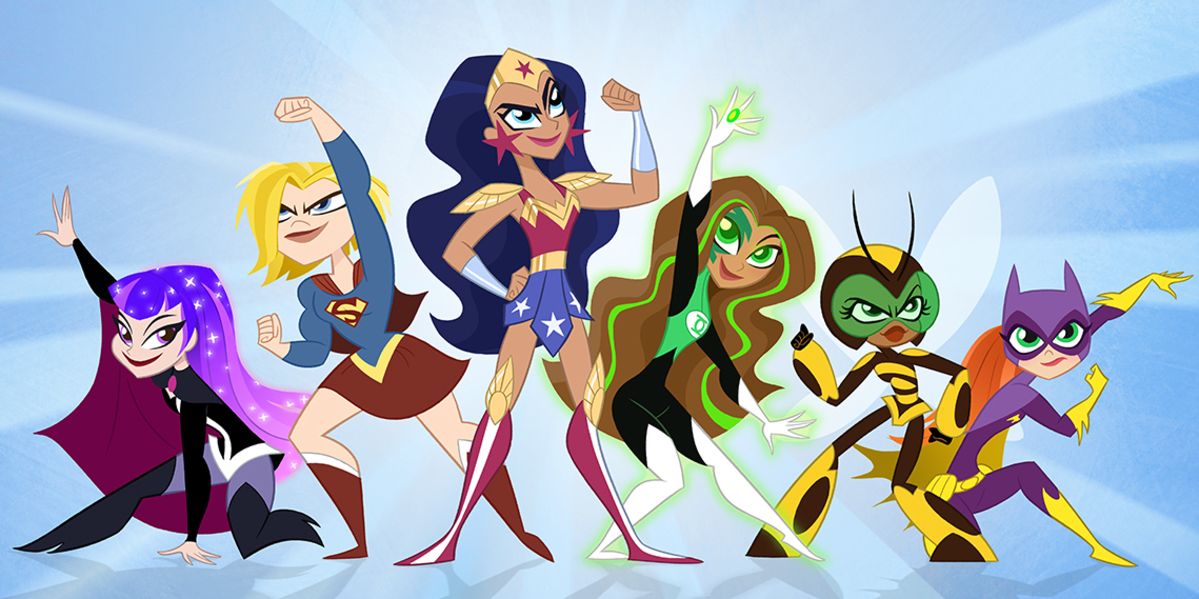With a title like DC Super Hero Girls, it's possible people will brush off this new Cartoon Network animated series as being just for girls. However, that's not the case. That's the message the show’s creative team and cast brought to Comic-Con International: San Diego this year. Though the show will feature six superhero girls and six supervillain girls, their goal is to have the series' ideas resonate with and entertain all children.
In an interview with CBR, Executive Producer Lauren Faust and voice actor Nicole Sullivan discussed the potential power of this show to inspire children, whether they’re a boy or a girl, as well as the freedom of having multiple female characters in a series.
CBR: This show seems really empowering for children. What is your overall goal for this series, particularly for girls?
Lauren Faust: I need to think about that for a second because I think far too often when people make stuff for girls, it’s less about inspiring them, less about entertaining them and less about reflecting their own experiences back to them. All too often, it’s about telling them how we expect them to behave, and I hate that. I don’t want to do that. So, what we’re doing with our show is we’re trying to reflect their experiences back to them, but in a super lens.
A lot of shows about teenage superheroes usually start with the usual teenage plot -- who’s the bad guy, what’s the bad guy doing, and how do we save the day -- and then they put a teenage spin on it. We’re going to have stories like that, but the bulk of our stories are the opposite. What is something that a teenager goes through… and how can we reflect those feelings and experiences and emotions through a super lens? Like dealing with something that kids might deal with today.
We have an episode featuring Livewire that’s about online gossiping. It’s a big superhero fight, but underneath it all, it’s about being embarrassed about what’s somebody saying about you online. A lot of our stories are a little bit more like that… It’s more about she’s embarrassing us, and how are we going to deal with this?
We’re not just trying to do this in a super way. We’re also trying to do this in a funny way. So, we’re bringing humor, heart and heroics all mixed up in one big package.
There’s sort of a stereotype with the show being just for girls, but it’s not. How do you feel like this show shatters this stereotype and that it’s really for boys and girls?
Nicole Sullivan: The same way that any of those boys shows would have done it in the past. Even Teen Titans Go! was very much a boys-centric male humor type thing. Then you watch it and you go, “Oh, this is funny. I get it. I understand these characters.” You show up, and you make funny jokes. You tell good stories, and you have a lot of fight scenes. And then the boys come. Jokes and fights, right? Nothing like it. It’s all boys and girls want I think.
In the past year, there’s been a rise in toxic masculinity, to say the least. Do you have hopes as a mother for this show to impact boys and the way they treat young girls?
Sullivan: That’s a really interesting question… I think the way to get respect is to demand respect. You start there. Now, it doesn’t mean everyone’s going to necessarily chime in and do the thing you’re supposed to do, but you have to own it first. You have to show people what you deserve and then they can either do it or not do it.
And I think that’s what these girls do. They show up, they put up, they’re good fighters, they’re good friends, they’re great superheroes. People can come, they can agree or disagree with them, they can come at them or not come at them, and I think that’s what I would like to teach my boys too. You got to take their lead. If they’re saying they’re this kind of person and want to be treated that way, you can either do it or leave them alone. But the option is not to undermine somebody, not to undermine a woman.
With a show like DC Super Hero Girls, how do you combat the challenges and perceptions of diversity?
Faust: Usually, [girls] are the token. Usually, they’re the one character, and so all this pressure to be perfect, to be flawless, to represent all the encapsulation of whatever that person is -- whether they’re a minority or a girl -- gets shoved onto that one character.
On this show, when you have six girls, you don’t have that pressure -- nobody is the girl. So, they get to have flaws. They get to have differences. If you have a character who somebody might call a stereotype -- like she’s prissy, or if you have a character that actually does like to get her nails done -- you have five other characters who don’t care about it, so nobody pressures you to take that idea out of it. You can show diversity in personalities because you have so many of them…
Now, we have six girls -- six heroes -- six female villains. We get to run the gamut of what it means to be a young girl. We’ve got 12 characters. We have to make them all very different from one another, so there’s a lot of freedom in it that you don’t necessarily get when your character’s a token.
The first DC Super Hero Girls short premieres before Teen Titans Go! To the Movies in theaters July 27.

